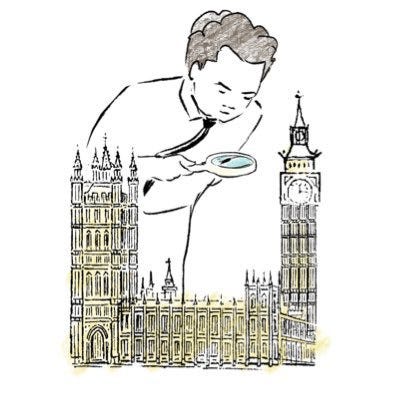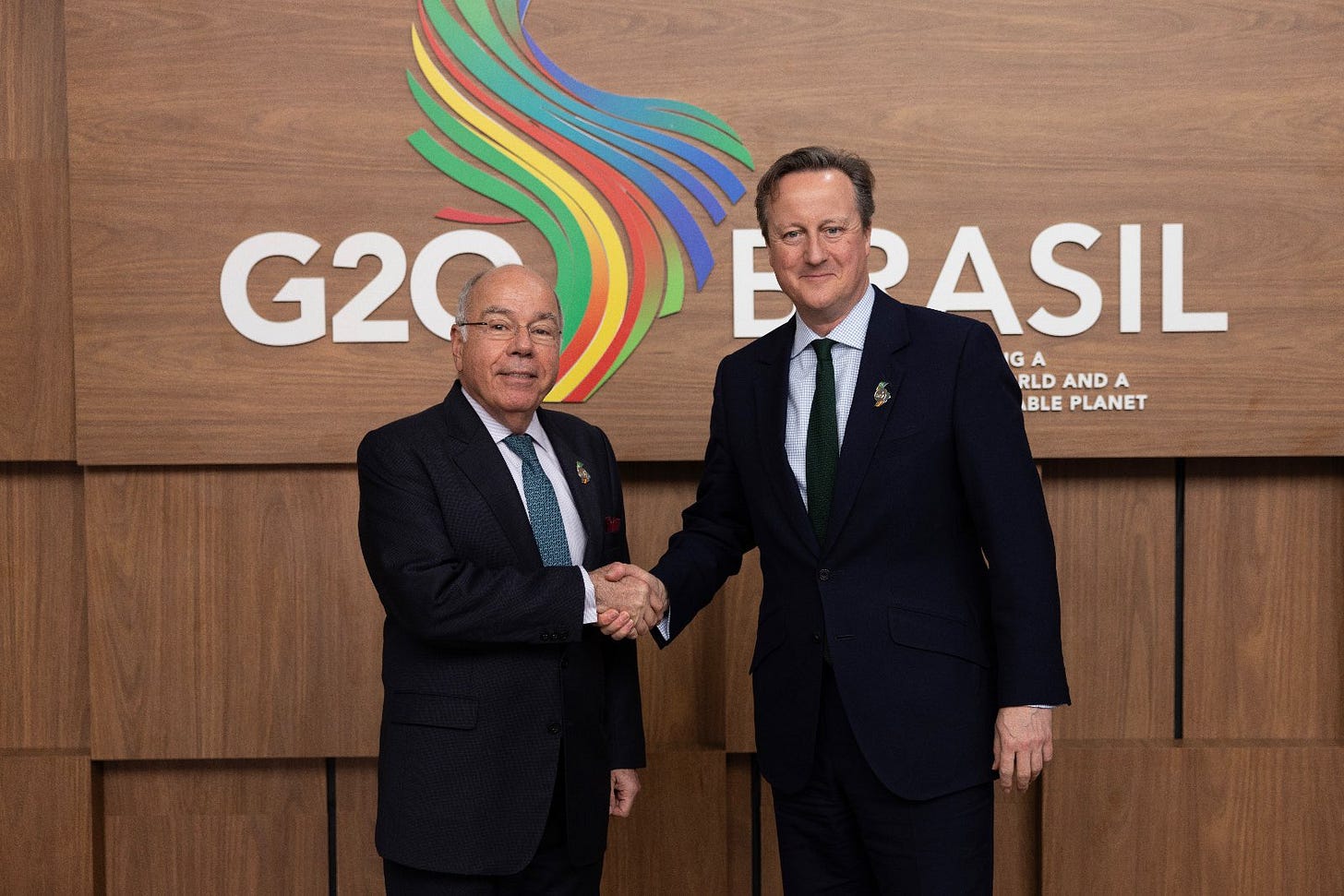HSBC results, new sanctions strategy, Xinjiang forced labour report
A Beijing to Britain briefing
Hello,
I would keep a very close eye on what some cyber analysts have named ‘China’s Snowden moment’. Earlier this week, a Taiwan-based Twitter account shared a link to the coding website GitHub [link here for those interested] with the caption “someone just leaked a bunch of internal Chinese government documents.” Over the following hours and days, hundreds of analysts trawled through the data and documents, translating them from Mandarin into English.
The documents show spyware developed by I-Soon, a Chinese infosec company with links to the Government’s Ministry of Public Security, hence why it is being termed the I-S00N leak. It reveals an incredibly wide-spread number of tools which the company seems to suggest it can use to access everything from Windows to Apple iOS systems, shows hardware used for (Chinese) agents overseas, and, crucially, includes presentations and other documents claiming to have breached or targeted India’s defence ministry, NATO and the UK’s National Crime Agency. It also includes a number of UK Government departments – the Cabinet Office, Home Office, and FCDO – with a question from an unknown client if the Chinese firm can “take it down”.
As website Cybernews.com explains:
Attackers can supposedly target Android and iOS devices, obtaining a multitude of sensitive information, such as hardware information, GPS data, contacts, media files, and real-time audio recordings.
The alleged documentation reveals several gadgets that attackers can use to spy on victims, including WiFi-capable devices with the capability to inject targeted Android phones via a WiFi signal. From the outside, the device supposedly looks like a portable battery from a well-known Chinese manufacturer.
Azaka Sekai's analysis of the documents, which are written in Mandarin, details several different types of gadgets allegedly used by attackers, as well as products for spying on individuals using Chinese social media platforms such as Weibo, Baidu, and WeChat.
The information also revealed sensitive details from multiple telecommunications providers, for example, Beeline and Tele2 providers operating in Kazakhstan.
From the UK perspective, The Guardian has the best write-up.
- Sam Hogg, Editor
In this week’s briefing, we examine:
David Cameron visits the United Nations
Parliament debates matters related to China
HSBC and Standard Chartered results
Xinjiang research
Diplomacy Tracker
Japan's Major General Akisugu Kimura, Commander of the Cyber Defense Command, visited the UK to learn more about Strategic Command’s role at the forefront of digital capabilities within Defence.The British Government announced a new £400m development portfolio that will mobilise vital private sector funding in development, tackle the climate crisis and support economic growth in Nepal.UK Foreign Office Minister Lord Ahmed visits India.Australia and the UK sign the Online Safety and Security Memorandum of Understanding (MoU), "ushering in a new era of bilateral cooperation between the two countries to support safer and more positive experience online."The UK sanctions three Chinese companies for their role in Russia-Ukraine war.The UK’s Ambassador to China Caroline Wilson met China's Vice Minister of Finance Liao Min. The pair "agreed to work towards sustained engagement in the year ahead on the shared economic challenges and opportunities" for both counties.Politics
On the national stage, Foreign Secretary David Cameron was in Brazil for the G20 meeting of Foreign Ministers. Here he stressed the UK’s top strategic communications lines and priorities - namely bringing an end to the illegal Russian invasion of Ukraine. The G20 offers a different battleground than the much cosier G7, as it includes countries with their own view of how the international system should work, including Brazil (chairing this year), South Africa and Turkey. That lack of consensus perhaps explains why Cameron didn’t raise China-related issues in the same way the Government would have during a G7 meeting. The Foreign Secretary also delivered a speech at the United Nations on Russia’s invasion, implicitly warning about the connection between Ukraine and Taiwan “ultimately we must stay strong not only for the sake of Ukraine…If Putin were to eke out some kind of win, the rest of the world would suffer too...others will be emboldened to turn to fighting when it suits them. No country with a large, aggressive neighbour would be safe.”
In China and Taiwan, British officials shared messaging over the two-year anniversary of the war. “Through propaganda and disinformation Putin is using false history to justify his own geopolitical ambitions. China should meaningfully engage with Ukraine’s peace efforts,” said British Ambassador Caroline Wilson. “Today marks 2 years since Russia’s illegal invasion of Ukraine. Russia’s war in Ukraine is an unprovoked, premeditated and barbaric attack. We #StandWithUkraine for as long as it takes so Ukraine not only wins the war, but emerges from it as a strong & free country,” tweeted John Dennis, Representative for British Office, Taipei.
Back in Westminster, the Israel-Gaza conflict saw an unedifying Parliamentary session on Wednesday, which critics would argue shows how poor politicians have become at explaining complex foreign policy without turning it into an SW1 micro-drama. Regardless, given their dispersed nature, it is most useful to break down this week’s Parliamentary discussions of China-related matters thematically.
Taiwan: Two further questions on air routes above the island, which the Taiwanese flagged as being altered by the Chinese Government recently. Fellow IPAC-ers Iain Duncan Smith and Lord Alton asked a similar set of questions on the issue, as did Lord Rogan and Lord Blencathra.
Defence: It was Defence Secretary Grant Shapps’ week to stand in the Commons, where MPs asked him about AUKUS. Tory Giles Watling asked if the triumvirate could be expanded to include Canada, and Shapps responded by saying that Pillar II - the future technologies section - may end up including Canada and New Zealand among other nations. Worth watching.
Steel: As our research reports have raised consistently for the last three years, steel is an industry that Labour has identified as being important for both jobs and national security, and undervalued by the Conservative Government. A debate on the issue was brought forward this week by Nia Griffith MP, Labour’s Shadow Minister for International Trade and the Cabinet Office which saw her and her party colleagues roundly criticise Government minister Nus Ghani MP’s portfolio. Ghani attempted to defend the approach, stating that some of the challenges facing the UK’s steel sector “stem from complex international dynamics. China’s long-standing practice of flooding the global steel market with subsidised products has been a significant factor. Despite our efforts to mitigate the impact of cheap imports through domestic measures and challenging unfair practices internationally, we cannot ignore the harsh economic reality.” Sarah Jones MP, Labour’s Shadow Minister for Industry and Decarbonisation, was unconvinced with that excuse: “On the point that the Minister makes about China, we know that the cheapest steel from China has been a factor, but major importers to the UK are western European nations: the Netherlands, Italy, Spain and Germany. We are not competing with them, either. There is a fundamental problem in the way that we run this economy, which has meant that our industries cannot be competitive when others in the European Union can be.”
Bill Readings: Peers scrutinised the details of two Bills: the Economic Activity of Public Bodies (Overseas Matters) Bill, and the Trade (Comprehensive and Progressive Agreement for Trans-Pacific Partnership) Bill. In the case of the former, there is still concern that the way it is written would stop local authorities from being able to boycott China-related goods, as the Government wants to stop local councils from having autonomous foreign policies (with an eye on Israel). The latter saw Labour MPs try and probe the Government’s view on what considerations it had made for China and Taiwan’s applications to join the CPTPP.
Death of Alexei Navalny: Peers debated what looks to be the murder of Russian opposition figure Alexei Navalny. China was mentioned in two contexts: first, when Peers asked what the Government was doing to stop “the sanction-busting oil practices, particularly through routes such as China and India”, and second, when Lord Watson asked what “reassurance can the Minister give to Russian and Chinese exiles and British Sikhs that they are safe to express themselves freely in the UK?”
Elsewhere, former Deputy Prime Minister Dominic Raab turned up in The Telegraph arguing that China’s efforts to dominate materials used to make wind turbines, solar panels and electric vehicles (EVs) risked pushing up prices for the rest of the world. “If you talk about the green transition, we can’t do any of that stuff without the lithium, the graphite and the other critical minerals needed to power the wind turbines and solar panels, and EV batteries. It’s not a free market, if you have such concentration of both production and refinement of these critical minerals [in China]. So what will happen? Well, either the price will go up – and that will cost us all, taxpayers and business – or we just won’t meet the targets to reach net zero by 2050. That’s ultimately what I think the issue will be for taxpayers and for businesses, particularly in the green sector.” Coincidentally, Raab has recently joined private equity firm Appian Capital, which invests in mining, as a geopolitical advisor, and is also set to chair a new committee formed by Appian and SAFE (Securing America’s Future Energy), a non-profit that advises the US Government on energy security policy, it was reported.
Raising a handful of weary eyebrows, the UK’s shortest-serving Prime Minister in history went to America to speak about how the West is doomed unless Conservatives come together to save it. Liz Truss published an accompanying Fox article - 'I'm a former British prime minister who believes the West is doomed unless conservatives do this.’ The entire shtick looks like a potential post-Parliament career pitch.




